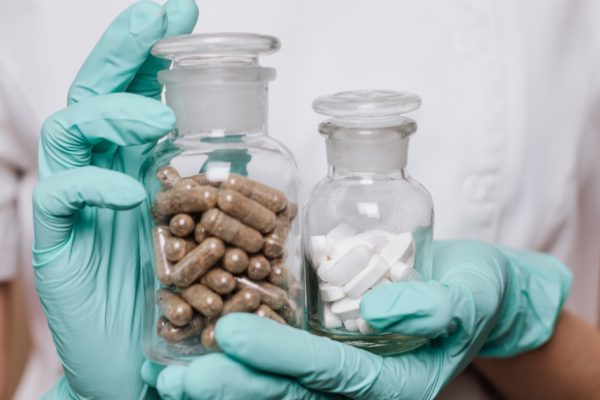What Vitamins to Aid Digestion?
By Kathleen Nguyen, BAPS, PharmD – Kathleen is a licensed Pharmacist and Principal at BumpVitamins.com
Do you have digestion problems or feel uncomfortable after you eat? Do you experience bloating, stomach aches, or have irritable bowel syndrome (IBS), or inflammatory bowel disease (IBD)? One possible cause of these ailments may be a lack of the right blend of nutrients in your diet. The digestive system needs essential vitamins to properly function and support the gastrointestinal tract. Read below to learn about the top 5 vitamins to help support your gut and promote better digestion.

1. Probiotics
The stomach and intestines cannot break down food on their own. Your digestive tract relies upon various types of bacteria to help break down food and extract the nutrients your body needs. Your intestines carry millions of microbes which consist of good gut bacteria and bad gut bacteria, this is also known as your “biome”. When the bad gut bacteria outnumber the good bacteria, gas, and other unwanted byproducts can build up in your system, which may cause bloating, abdominal pain, and other digestive issues (1).
Probiotics are a blend of good bacteria that naturally exist in your gut. Taking supplemental probiotics will help you maintain a healthy balance of good bacteria in your digestive tract while eliminating the harmful and toxic microbes and boosting your immune system (1). You may especially want to consider taking probiotics if you have irritable bowel syndrome (IBS), inflammatory bowel disease (IBD) or have complications involving bloating and/or diarrhea.
2. Ginger
Ginger is a spice and has been used as an herbal medicine for digestive aid and various health conditions for thousands of years. Ginger is commonly used to treat nausea and vomiting but can also be used to maintain digestive functioning. Research has shown that ginger may have anti-inflammatory, antioxidant, and anti-cancer properties which serve as a protective effect against several health conditions (2).
Due to its antioxidant and anti-inflammatory properties, ginger may help reduce intestinal cramping, indigestion, and bloating (3). Studies have also shown that ginger stimulates gastric mobility and the breakdown of foods (4). You may want to consider adding ginger to your diet if you experience nausea, bloating, indigestion, and/or have discomfort in your stomach.
3. Antioxidants (Vitamin A, C, E)
Antioxidants such as vitamin A, C, and E are known to have anti-aging and chemoprotective properties, they also aid in removing free radicals that damage DNA (5). Antioxidants aid in digestion by protecting the lining of the intestines as well as having anti-inflammatory properties. When antioxidants are combined with other supplements, such as probiotics, they may dramatically enhance the digestive tract’s ability to heal itself (6).
You may want to consider taking antioxidants if you have irritable bowel syndrome (IBS), inflammatory bowel disease (IBD), and/or discomfit in your stomach. Antioxidant-rich foods include berries, nuts, broccoli, peppers, and tomatoes.
4. Vitamin D
Vitamin D not only plays a key role in calcium and mineral absorption but may also help in reducing inflammation. Vitamin D supports the digestive system by reducing inflammatory responses and serves as a protective layer for the intestines against infection. Research has shown that individuals with inflammatory bowel disease (IBD), which includes Crohn’s disease and ulcerative colitis, could be vitamin D deficient. Due to the anti-inflammatory effect of vitamin D, it may be beneficial in the treatment of these health conditions. Studies have also shown that vitamin D may reduce the risk of colorectal cancer (7, 8).
It is estimated that about 1 billion individuals worldwide have a vitamin D deficiency (9). You may especially want to consider vitamin D supplements if you are not receiving enough sunlight, rarely consume seafood, or have an inflammatory bowel disease (IBD). Foods containing vitamin D include egg yolk, saltwater fish, fortified milk, and cereal.
5. B Vitamins
B vitamins also aid digestion. There are 12 different types of B vitamins, each one plays an important role in the human body. B vitamins not only promote energy but are also vital for the function and health of your digestive tract. B vitamins assist in the production of stomach acid, maintaining peristalsis, and helping the gut break down carbohydrates, fats, and protein to produce energy (10). Key B vitamins to aid digestion include vitamin B1 (thiamine), B3 (niacin), B6 (pyridoxine), and B7 (biotin).
You may want to consider taking B vitamins if you have problems with indigestion or have health conditions such as irritable down syndrome (IBS) or inflammatory bowel disease (IBD). Studies have also shown that B vitamins may play a protective role in colorectal cancer (1). B vitamins are essential to the human body and can be found in meat, fish, dairy products, and leafy greens.
Final Thoughts
At BUMP vitamins, we carry several vitamins to aid digestion. These include our antioxidant complex, ginger root extract, probiotics, vitamin C, vitamin D, and our everyday multivitamin which contains B vitamins and an assortment of other essential nutrients to promote your overall health. If you are having stomach discomfort, indigestion, diarrhea, or have a health condition such as irritable bowel syndrome (IBS) or inflammatory bowel disease (IBD), you should consider adding the digestion bundle or any of the aforementioned supplements to your diet.
You should always consult your doctor before taking any vitamins or supplements. Communicate with your doctor, pharmacist, and other healthcare providers about any dietary supplements and medicines you take. They can tell you if those dietary supplements might interact or interfere with your prescription or over-the-counter medicines or if the medicines might interfere with how your body absorbs, uses, or breaks down nutrients.
References:
- Rowland, I., et al. (2017). “Gut microbiota functions: Metabolism of nutrients and other food
components”.European Journal of Nutrition, 57(1), 1-24. - Bode, A., Dong, Z. (2011). “The Amazing and Mighty Ginger”.Oxidative Stress and Disease Herbal Medicine, 131-156.
- Bodagh, M. N., et al. (2018). “Ginger in gastrointestinal disorders: A systematic review of clinical trials”.Food Science & Nutrition, 7(1), 96-108.
- Hu, M. (2011). “Effect of ginger on gastric motility and symptoms of functional dyspepsia”.World Journal of Gastroenterology, 17(1), 105-110.
- Masri, O. A., et al. (2015). “Role of vitamins in gastrointestinal diseases”.World Journal of Gastroenterology, 21(17), 5191-5209.
- Miller, M. J., et al. (2001). “Dietary antioxidants protect gut epithelial cells from oxidant-induced apoptosis”.BMC Complementary and Alternative Medicine, 1(1).
- American Cancer Society (accessed December 10, 2020). “Vitamin D Levels Linked to Lower colorectal Cancer Risk”.
- Reich, K. M. (2014). “Vitamin D improves inflammatory bowel disease outcomes: Basic science and clinical review”.World Journal of Gastroenterology, 20(17), 4934-4947.
- Sizar O., et al. (2020) “Vitamin D Deficiency”.
- Harvard School of Public Health (accessed December 10, 2020). “B Vitamins”.




